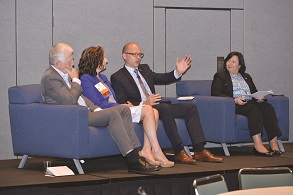News / NHSI targets £500m deficit and takes aim at locum costs
NHS Improvement has signalled an even greater focus on reducing staff costs in 2017/18 – particularly medical locum costs – as it targets an overall aggregate deficit of around £500m.
Announcing year-end figures for the provider sector in 2016/17, in which the aggregate deficit fell to £791m, the oversight body said agency staff spending fell by £700m, but this was still short of the planned reduction.

Controls introduced in October 2015 led to agency spending falling from £3.6bn in 2015/16 to £2.9bn in 2016/17, with 85% of providers reporting year-on-year reductions in agency bills.
The oversight body said this was a huge achievement, but more work was needed – providers overshot their planned agency spending by £559m and only 46 providers achieved their expenditure ceiling.
Much of the variance from plan was due to medical locum spending resulting from a shortage in A&E doctors. NHS Improvement is working with the Royal College of Emergency Medicine to target a £150m year-on-year reduction in locum spending in 2017/18. It also wants to address permanent and bank pay costs. The overall provider pay bill was almost £51bn in 2016/17, £811m more than plan and £1.8bn higher than 2015/16.
Pay inflation, including pay rises, drift and pensions were significant elements of this, adding an estimated 3.3% to costs. NHS Improvement said that taking these pressures into account, the pay bill grew by 0.5% in real terms, but this should be seen in the context of a 2.4% growth in cost weighted activity.
Overall, providers finished the financial year with a £791m deficit (£2.4bn in 2015/16), after application of the £1.8bn sustainability and transformation fund (STF). This compared with a planned deficit of £580m.
NHS Improvement said the final position was driven by cost savings, which totalled £3.1bn (3.7%). The oversight body’s work with trusts in financial special measures had generated more than £100m in savings, while its financial improvement programme had identified a further £100m.
NHS Improvement chief executive Jim Mackey said: ‘The NHS has delivered this turnaround at the same time as dealing with very high levels of demand – particularly over the winter period. In addition, there have been great efforts made in improving outcomes for patients.
‘People should feel justly proud of what they’ve achieved this year, and go into next year knowing that, while it will be hard, the challenge certainly is not impossible.’
He added that providers had been challenged to achieve an overall deficit of £496m in the current financial year.
In 2016/17, cost savings fell short of plan by £266m, largely due to the adverse variance in pay costs. Three-quarters (£2.3bn) of the savings were recurrent – below the planned level of 92%.
The growth in acute activity and rising costs led to a £1.1bn overspend on plan for non-pay items, largely driven by drugs (£139m), clinical and general supplies (£343m) and premises (£382m). Record emergency demand had reduced providers’ elective capacity – many paid for waiting list initiatives or outsourced the work, costing £209m and £381m, respectively.
Pre-audit the overall financial position was a deficit of £735m, but this moved to £791m as two trusts deferred transactions to the current financial year. These were Royal Free NHS Foundation Trust (£47m) and Royal Liverpool and Broadgreen University Hospitals NHS Trust (£10m).
NHS Provider chief executive Chris Hopson (above right) said: ‘These figures should be seen in the context of the enormous financial pressures trusts face, but also the solid progress that has been made in controlling the runaway deficits of the last three years.’
On the world stage
HFMA president Mark Orchard
accompanied association chief executive Mark Knight to the US HFMA’s annual ANI conference in Orlando towards the end of June. The annual national institute brought together 4,500 healthcare finance professionals and other stakeholders for its exhibition and conference, ‘Collaborating for the future’. 
Mr Orchard took part in a panel session on international perspectives on healthcare, examining the challenges and opportunities facing health systems across the world.
Mr Orchard (centre) is pictured with (from left): Mark Lawrence, vice president HFMA Australia and executive director of finance, capital and contracts for Western Health, which manages three acute hospitals in Melbourne, Australia; Carol Friesen, vice-president of health system services for Bryan Health in Lincoln Nebraska and incoming chair of the US HFMA; and Mary Mirabelli, vice-president of Global Healthcare Practice at Hewlett Packard Enterprise and 2016/17 US HFMA chair.
Related content
The Institute’s annual costing conference provides the NHS with the latest developments and guidance in NHS costing.
The value masterclass shares examples of organisations and systems that have pursued a value-driven approach and the results they have achieved.